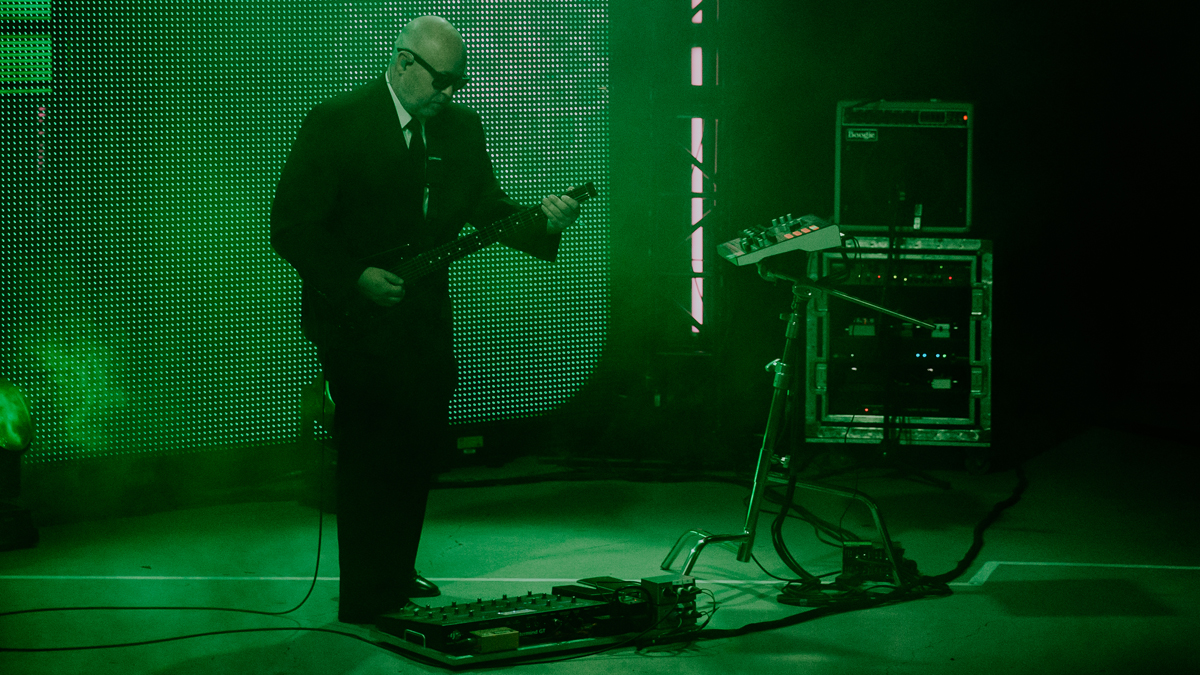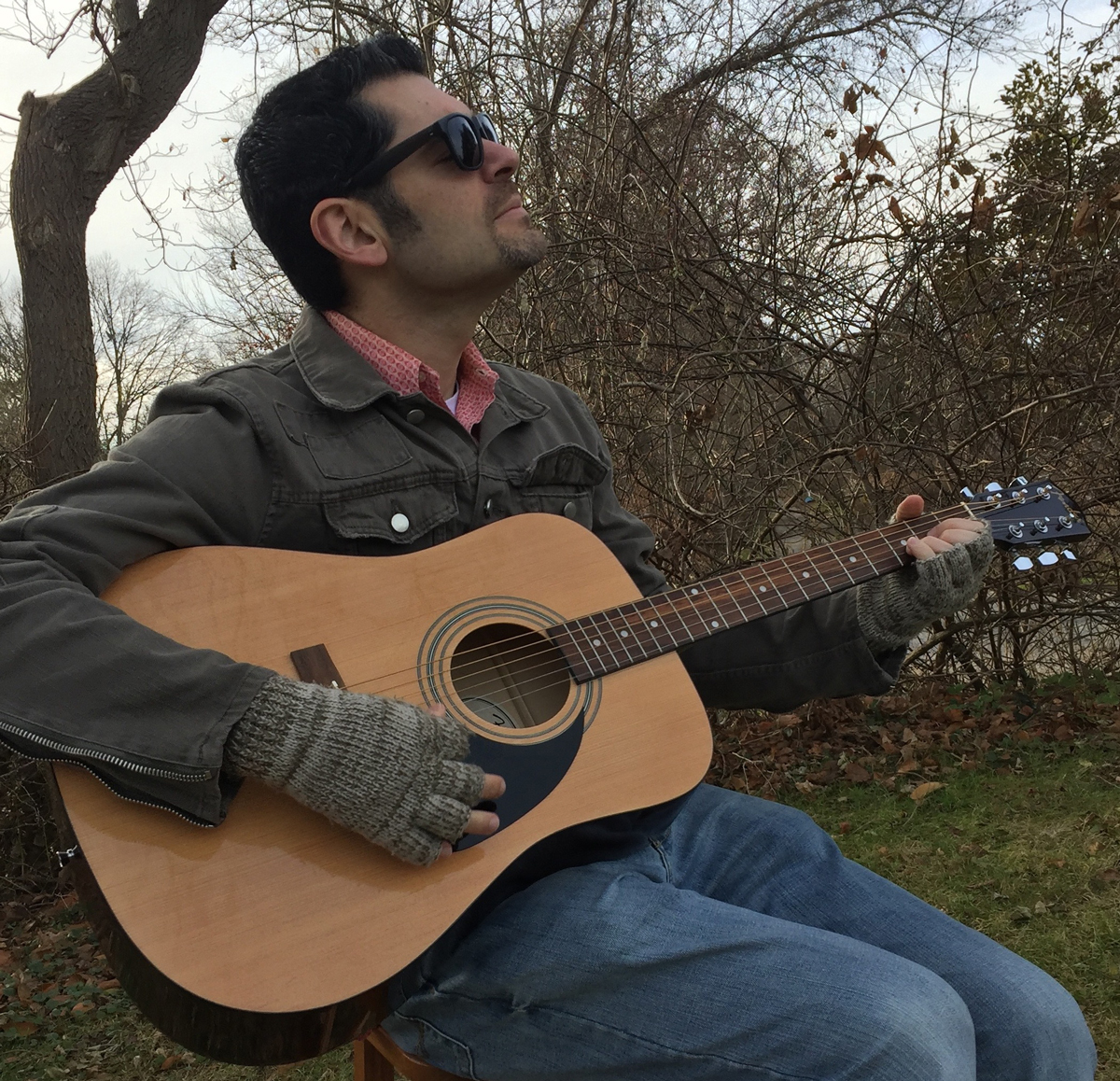Puscifer's Mat Mitchell: “Songwriting is like playing a three-way game of chess. What you do next is based on what the other player does”
The multi-instrumentalist discusses the Maynard James Keenan-fronted outfit's democratic songwriting process, finishing Existential Reckoning in lockdown and his vast setup ahead of Puscifer's first US tour since 2016

Of the three bands featuring singer Maynard James Keenan – Tool, A Perfect Circle, and Puscifer – Puscifer is the only project that does not put guitar front and center. This was most recently evidenced on their last studio offering, 2020’s Existential Reckoning, which was also released in 2021 as a concert recording, Existential Reckoning: Live at Arcosanti.
But Puscifer’s guitarist, Mat Mitchell, does do an expert job of providing perfectly placed textural guitar parts, in addition to supplying bass and keyboards with the help of his bandmates.
Mitchell has been with the band since their very first release (2007’s “V” Is for Vagina), and has contributed to every subsequent album (2011’s Conditions of My Parole and 2015’s Money Shot). He's considered one of three full-time members, alongside Keenan and the group’s other singer and multi-instrumentalist, Carina Round.
With the announcement that Puscifer will be launching their first US tour since 2016 this June, Mitchell spoke with Guitar World about how the band finished Existential Reckoning during lockdown, his expansive guitar setup, and what fans can expect from the upcoming tour.
How did the songwriting work on Existential Reckoning?
“Typically, the writing process starts with me presenting a bunch of ‘brainstorm ideas’. I'm not really thinking about songs or structure or anything like that, just coming up with interesting melodies, rhythms or textures. That usually goes into a folder that Carina and Maynard have access to.
“When Maynard has bandwidth, he’ll go through and find which ones resonate with him, and then we color-code those. The ones that I see resonated with him, I start building out. And then I’ll build them into more formed arrangements, and then he and I will go back and forth.
Get The Pick Newsletter
All the latest guitar news, interviews, lessons, reviews, deals and more, direct to your inbox!
“Once things are developed enough, he may sing a rhythmic thing or he may have a melody idea, and then it starts to form from there. Carina will come in and do her magic, and then we put it all together. Everyone has their input, so everyone is producing elements. But I’m recording and playing a lot of it.
Our songwriting stays very organic up to – and including – the mix
“Typically, the idea will start with something that I’ve come up with. And then, the way it collaborates… It’s like a three-way game of chess. What you do next is based on what the other player does.
“It’s not uncommon for someone to come up with a part, and then everything that’s been done prior to that gets redone, because this new thing completely changes the direction. So, it’s never a straight path of, ‘I do my part, now you put your part on top.’ It stays very organic up to – and including – the mix.”

What was your guitar setup for the album’s recording?
“I really like Robert Fripp's early stuff that he was doing with Peter Gabriel and David Bowie: that really 50/60 percent wet, slap[back] delay on a clean – but a little bit of bite – tone. For that, I used an old Mesa/Boogie Mark IIC+. It’s a combo and I changed out the speakers – it’s one of the Celestion Alnico Creams, which I think is a 90-watt.
“For guitars, everything was tracked on an old [1989] Steinberger GL that had an EMG HA single-coil I put in. Most stuff that I track historically with Puscifer has been done using a single coil.
“As for effects, anything that wasn’t software-done in the mix process was done through a desktop pedal company called OTO Machines. Its delay is a 12-bit delay, which is kind of reminiscent of the AMS and early Lexicon stuff. It also has one called the BAM, which is a reverb, as well as one called a BOUM, which is compression and overdrive.
“On the bass guitar side of things, I used a [1972] Rickenbacker 4001. Seymour Duncan had made me a Quarter Pound [pickup] for the Rick. I was worried when I got it that it was going to sound like a different kind of guitar, but it totally retains that Rick sound and feel. I also have a Custom Shop Fender Precision Bass ‘50s reissue that we used.
I’ve been working with Kiesel on a tailored version of their Type-X guitar for the tour. It will be a fixed bridge with one Seymour Duncan Antiquity Tele pickup
“For pedals, I definitely used the Malekko B:assmaster and the Prescription Electronics Depth Charge. For amplification, most of it was direct and then processed after the fact. But for the live stuff, it was the Gallien Krueger 2000RB. That’s a solid-state: super-clean, very punchy, lots of headroom. And that was going into a Bergantino 4x12.”
“Also, I’ve been working with Kiesel on a tailored version of their Type-X for the tour. It will be a fixed bridge with one Seymour Duncan Antiquity Tele pickup in the bridge, swamp ash body, and three-piece walnut/maple neck-through.”
What determines if you will play guitar, bass or keyboard on a Puscifer tune?
“I tend to play all of the above, and it really just depends on what is inspiring me. A lot of times, it will start with a guitar, bass, or keyboard.
“Having Greg [Edwards, bassist] is a new experience, because historically, I’ve played a lot of the parts. He’s a really good bass player – that’s his foundation – whereas I’m a guitar player that picks up a bass and plays it like a guitar. Having that unique voice of his was a cool addition.
“It was always kind of, 'Here’s the song. What do you think it needs? Add your flavor, and we’ll go from there.'”
Puscifer were one of the first bands to do a livestreamed performance during the pandemic, which included the Existential Reckoning album performed in its entirety in October 2020. Was it difficult to juggle playing several instruments?
“We were in the middle of writing the record when everything went into lockdown. Fortunately, we have a private space that we can work in, so I can still come into work and sit in a room by myself.
“We’ve got a live room that Carina was set up in, so we were able to isolate but still work together. And the same thing with Maynard – when he would come in, he would work in that room. We were able to get a lot of work done and finish the record under lockdown.
“When lockdown happened, we had the discussion of, ‘Do we put this all on hold?’ Because we knew the chances of touring were probably low. We just decided to forge ahead and put a record out. And as part of those discussions, we decided to do a streamed show.
“Pretty much the day the mixes went to mastering, we pivoted and started thinking about how to reproduce it. Typically when we do a tour, we reinterpret songs or we change things up, or make things a little different than they were in the studio.
“But, since this was the first time a lot of people would have heard these songs, we wanted to keep it as accurate to the record as possible. That created a lot of challenges – everyone had a keyboard in front of them, and everyone had whatever their fundamental instrument is. There was a little bit of a challenge in interpreting that, but there was enough of us and enough technology to do it.”
Which Puscifer tunes are you most proud of guitar-wise?
“There are a couple on the new record that I really like. The Underwhelming is super-cool – I like the melody. And Bullet Train to Iowa is cool, too – it takes something that is just a I-IV-V blues thing and tries to make it so the guitar can be forward but not flashy, but memorable and melodic. And tone-wise, it was simple – just a single-coil with a little bit of bite and delay. Those two tracks are good representations of trying to make something unique but simple at the same time.”
What can fans expect from Puscifer’s upcoming US tour?
“In typical Puscifer fashion, we like to try to do things that we haven’t done before. Hopefully we'll do things that people don’t expect us to. There is definitely going to be a root in the Arcosanti show, because that was the beginning of this tour. If you’ve seen a Puscifer show, you know what to expect: the unexpected. We try to keep it fun, interesting, and unique.”
- Existential Reckoning: Live at Arcosanti is available now. Tickets and dates for Puscifer's upcoming tour can be found on their website.
Greg is a contributing writer at Guitar World. He has written for other outlets over the years, and has been lucky to interview some of his favorite all-time guitarists and bassists: Tony Iommi, Ace Frehley, Adrian Belew, Andy Summers, East Bay Ray, Billy Corgan, Alex Lifeson, Geddy Lee, Les Claypool, and Mike Watt, among others (and even took lessons from John Petrucci back in the summer of ’91!). He is the author of such books as Grunge Is Dead: The Oral History of Seattle Rock Music, Shredders: The Oral History of Speed Guitar (And More) and Touched by Magic: The Tommy Bolin Story.
“A virtuoso beyond virtuosos”: Matteo Mancuso has become one of the hottest guitar talents on the planet – now he’s finally announced his first headline US tour
“His songs are timeless, you can’t tell if they were written in the 1400s or now”: Michael Hurley, guitarist and singer/songwriter known as the ‘Godfather of freak folk,’ dies at 83










